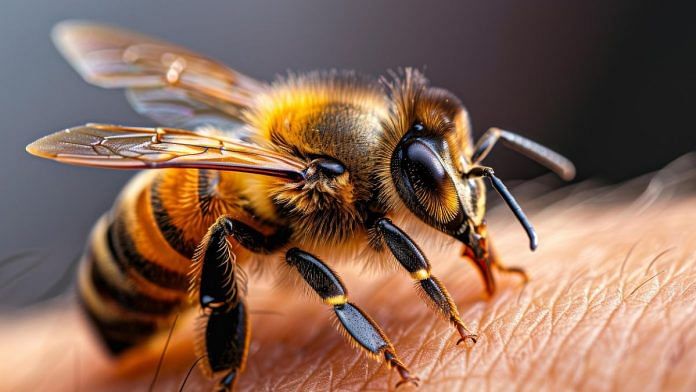The bizarre turn of events that led to the businessman’s death before he could receive medical care left many puzzled, especially since just hours before, Kapur had posted on social media about life’s unpredictability, reflecting on the tragic crash of a London-bound Air India flight near Ahmedabad.
Cardiologists maintain that though rare, a bee sting in the mouth can trigger a storm of acute severe allergic reactions that can be lethal.
There have been scientifically documented cases of heart attacks following bee stings in the mouth, which is particularly life-threatening, Dr Ashish Agarwal, Director of Cardiology with Aakash Healthcare told ThePrint.
The is believed to involve an allergic reaction triggered by the sting, which leads to the release of certain chemicals in the body.
“As a result, vasospasm or narrowing of the arteries of the heart is induced and it leads to a heart attack through a series of dangerous but quick chemical reactions,” said Agarwal.
According to specialists, the mechanism behind this rare occurrence is believed to involve the most severe allergic reaction—called anaphylaxis—triggered by the sting and other allergies, which leads to the release of certain chemicals in the body.
These chemicals include inflammatory mediators such as histamines and leukotrienes.
Inflammatory mediators, while crucial for the body’s defence, can become life threatening when their release is excessive or dysregulated due to overwhelmed systemic inflammation.
According to Dr Prashant Pawar, cardiologist with Fortis Hiranandani Hospital in Mumbai, honeybees produce poison in their secretory glands, and envenomation (exposure to a poison or toxin resulting from a bite or sting from an animal) occurs during the sting or bee bite.
These bees, when they bite, can cause allergic reactions such as breathlessness, a drop or rise in blood pressure, and heart rate in some people.
“Additionally, it can also cause angioedema, which is swelling of the face and respiratory tract, because of which the patient can’t breathe, and it can also cause anaphylactic shock,” Pawar explained.
Some other experts pointed out that a bee sting in the mouth is not only life-threatening due to airway compromise, but can also potentially induce a rare but lethal form of myocardial infarction (MI) called Kounis Syndrome or allergic MI.
In common parlance, MI is known as a heart attack.
This syndrome, explained Dr Dibya Ranjan Behera, interventional cardiologist with Manipal Hospital in Bhubaneswar, is a rare combination of anaphylaxis reaction and acute coronary syndrome.
Bee venom entering the body, particularly through mucus membranes with a generous blood supply such as mouth, can provoke an extreme immune response.
This, said the cardiologist, triggers mast cells (a type of white blood cell that plays a crucial role in immunity) to release inflammatory mediators, including histamines and leukotrienes, that can lead to coronary artery spasms or even plaque ruptures.
A rupture exposes thrombogenic components such as cholesterol and other substances to the bloodstream, triggering a clotting cascade.
In such conditions, there is a sudden drop in blood pressure, chest tightness, a severe inability to breathe, and the heart goes into a standstill, specialists say.
This allergic tidal wave can lead to diminished blood flow to the heart or full-blown heart attack, even in people who have no previous underlying heart disease.
This is categorised as Type I or Type II Kounis Syndrome in clinical practice, depending on the severity of the symptoms.
In many cases of anaphylaxis, prompt identification and administration of a drug called adrenaline or epinephrine is urgently required, pointed out Dr Sanjith Saseedharan, head of critical care with SL Raheja Hospital in Mumbai.
Sometimes combined treatment of the allergic and cardiac aspect is mandatory to avoid lethal consequences.
Anaphylaxis is known to occur due to various other reasons like drug allergies, food allergies like peanut allergies, apart from stings and insect bites.
Those with known allergies are therefore often advised to carry epinephrine auto-injector.
Experts also caution people to avoid open beverages outside and to don protective gear when gardening or hiking.
“Once anaphylaxis is suspected, it is essential to reach the nearest hospital for emergency care in such cases, as the treatment may require oxygen, medications, and sometimes artificial ventilation,” said Saseedharan.
(Edited by Zinnia Ray Chaudhuri)








